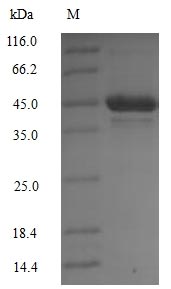The expression region of this recombinant Mouse Pdk1 covers amino acids 27-434. The theoretical molecular weight of the Pdk1 protein is 48.7 kDa. This Pdk1 recombinant protein is manufactured in baculovirus. The N-terminal 10xHis tag was fused into the coding gene segment of Pdk1, making it easier to detect and purify the Pdk1 recombinant protein in the later stages of expression and purification.
Pyruvate dehydrogenase kinase isoform 1 (Pdk1) is a highly studied protein, with a primary focus on metabolic regulation and the field of tumor biology. As a critical regulator of the tricarboxylic acid cycle, Pdk1 influences cellular energy metabolism by inhibiting decarboxylase activity through phosphorylation. One of its most crucial research directions is its role in tumor metabolism regulation. Pdk1 is found to be overexpressed in various cancers, closely linked to tumor growth and metabolic reprogramming. Additionally, Pdk1 is implicated in multiple research areas, including cardiovascular diseases, as its regulation of metabolic pathways and signaling networks positions it as a potential drug target for the treatment and prevention of related diseases.






